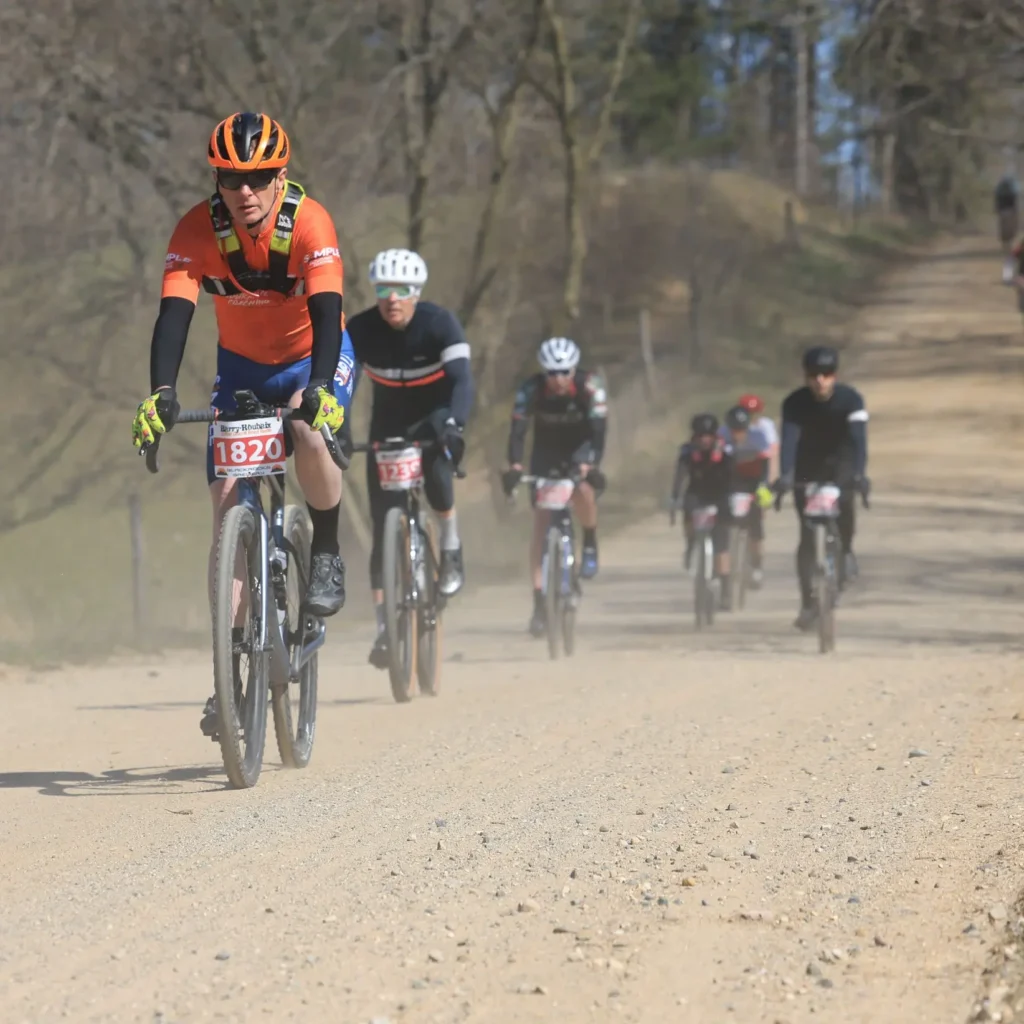Gravel racing has taken the cycling world by storm over the past few years.
Gravel has challenging terrain, long distances, and unpredictable weather. But beyond the physical challenges, there lies a hidden battle that makes gravel racing so uniquely demanding – the mental game.
In this blog post, we’ll dig into the depths of what makes gravel racing so mentally challenging. We’ll explore the possible mental benefits it brings to our lives and uncover strategies to prepare your mind for success on race day.
I’ve been working on mental toughness strategies for years and now make that an integral part of my coaching.

What makes gravel racing so mentally challenging?
Gravel racing can be a mental battlefield like no other. Unlike road cycling, where the smooth tarmac allows for predictable and controlled riding, gravel racing throws you into uncharted territory. The ever-changing terrain demands quick thinking and adaptability on the fly. Here are some of the main challenges:
- Constant uncertainty. You never know what lies around the next bend – it could be loose rocks, deep mud, or a steep ascent that tests your limits. This unpredictability keeps riders constantly on edge, requiring them to stay focused and make split-second decisions.
- Discomfort. The rough terrain can lead to vibrations rattling through your body, leaving you feeling physically exhausted sooner than expected. Pushing through this discomfort requires mental strength and resilience.
- Mental fatigue. Endurance events are mentally demanding as they require sustained concentration over long periods of time. Add challenging conditions and technical sections into the mix, and it becomes even more crucial to maintain focus throughout the race.
- Overcoming fear. Descending steep slopes or navigating tricky descents can be intimidating for many cyclists. It takes courage to push past those fears and trust your skills and instincts.
Gravel racing poses numerous mental challenges – coping with uncertainty, enduring physical discomforts, battling mental fatigue, and overcoming fear – all while trying to navigate unfamiliar terrains at high speeds!
It’s a great test of both physical endurance and mental fortitude that pushes everyday cyclists beyond their comfort zones.
What are the mental benefits of gravel racing?
Gravel racing isn’t just about physical endurance and stamina; it also offers numerous mental benefits for everyday cyclists.
- Improved focus and concentration. When navigating challenging terrain, riders need to stay alert and focused on the task at hand, making split-second decisions to avoid obstacles or choose the best line.
- Enhance mental resilience. The unpredictable nature of gravel races requires adaptability and quick thinking. Cyclists must be prepared for changing conditions, such as loose gravel or unexpected weather changes. This builds mental toughness and teaches athletes how to push through discomfort and adversity.
- Boost confidence levels. Successfully completing a tough race gives riders a sense of accomplishment and self-belief that can carry over into other areas of life. Knowing you’ve put the time in the gym, for example, can help your confidence.
- Opportunities for mindfulness and stress relief. Being out in nature, away from the pressures of daily life, allows cyclists to clear their minds and find peace in the present moment.
- Sense of community among participants. Connecting with fellow riders who share similar passions creates a supportive environment where individuals can learn from each other’s experiences.
What are good mental tactics to prepare for a gravel race?
Gravel racing is not just a physical challenge; it also requires mental strength and preparation.
To excel in this demanding sport, cyclists must develop effective mental tactics that will help them conquer the unpredictable terrain and push through the challenging conditions.
- One essential mental tactic for gravel racing is visualization. By mentally rehearsing the race beforehand, cyclists can familiarize themselves with the course layout, anticipate potential challenges, and envision themselves successfully navigating each section. Visualizing success can boost confidence and motivation on race day.
- Another important part of visualization is preparing for the inevitable issues that come up. What happens if you get a flat tire: Visualize yourself calmly fixing it and getting back on the road. What happens if a bottle flies out in a rocky section or you crash in loose gravel? Visualize yourself calmly dealing with whatever situation comes up. You can
- Another important strategy is goal-setting. Setting specific, achievable goals for both training and race day allows cyclists to stay focused and motivated throughout their preparation. Breaking down larger goals into smaller milestones provides a sense of accomplishment along the way. Periodizing your training and creating goals for each training block can be helpful.
- Maintaining a positive mindset is crucial during a gravel race. Accepting that there will be tough moments but believing in your ability to overcome them can make all the difference. Practicing positive self-talk during training rides will help build resilience when faced with adversity on race day. “Pedal” and “breathe” are the two mantras I practice during riding.
- Developing mental toughness through meditation or mindfulness exercises can enhance focus and concentration during a gravel race. Learning to quiet the mind and stay present in the moment allows cyclists to make quick decisions without getting overwhelmed by external distractions. This is something to practice in your training sessions.
- Finally, building mental toughness requires embracing discomfort during training sessions. Pushing beyond your comfort zone regularly prepares you for challenging situations that may arise during a gravel race. Embracing discomfort as an opportunity for growth strengthens both body and mind.
What are important mental toughness skills during a gravel race?
When it comes to gravel racing, mental toughness plays a crucial role in your performance.
The challenging terrain, unpredictable conditions, and long distances can test even the most experienced cyclists. So what are some important mental toughness skills that you should develop to excel in a gravel race?
- Resilience is key. Gravel racing can be physically and mentally demanding, with moments of fatigue and doubt creeping in. Being able to bounce back from setbacks and maintain your focus is essential.
- Staying present in the moment is vital during a gravel race. It’s easy for your mind to wander or get caught up in negative thoughts when faced with tough climbs or technical descents. By focusing on the present task at hand – whether it’s navigating rocky trails or maintaining a steady pace – you’ll be better equipped to handle the challenges. Again, focusing on words like “pedal” and “breathe” can help. Practicing yoga is a great way to work on breathing practice.
- Having a positive mindset can make all the difference during a gravel race. Instead of dwelling on potential difficulties ahead or past mistakes made, cultivate an optimistic attitude that allows you to see opportunities for growth and improvement.
- Furthermore, adaptability is crucial when tackling varying terrains and conditions encountered in gravel racing. Being flexible with your game plan and adjusting accordingly will enable you to navigate obstacles more effectively. This is where the visualization can come in. If you’ve practiced visualizing yourself calmly changing a flat tire, and you believe it, you’ll be able to adapt when something goes wrong.
What does research say about building mental toughness for cycling?
Research has shown that building mental toughness is crucial for success in cycling, including gravel racing.
One study found that athletes with higher levels of mental toughness were more likely to perform well under pressure and maintain focus during challenging situations.
Another study found that cyclists who engaged in mental skills training, such as visualization and positive self-talk, experienced improved performance and increased confidence.
One key aspect of building mental toughness for cycling is developing the ability to cope with pain and discomfort.
Research suggests that by embracing discomfort as a normal part of the sport, athletes can push through physical barriers and achieve their goals.
Additionally, practicing mindfulness techniques, such as deep breathing exercises or meditation, can help cyclists stay present in the moment and manage any negative thoughts or distractions.
Another important finding from research is that setting specific goals can enhance mental toughness.
By breaking down larger objectives into smaller achievable steps, cyclists can stay motivated and focused on their progress. Additionally, maintaining a positive mindset throughout training and competition has been linked to better overall performance.
Incorporating strategies from sports psychology can also be beneficial for building mental toughness in cycling.
Techniques such as imagery (mentally rehearsing successful rides), self-affirmations (repeating positive statements), goal-setting (setting targets for improvement), and focusing on process rather than outcome have all been shown to improve psychological resilience in athletes.

How can mental skills from endurance training help our everyday lives?
Mental skills from sports have a profound impact on our everyday lives.
Whether we realize it or not, the strategies and techniques used in sports can be applied to various aspects of our daily routines.
- Goal-setting. Athletes set specific, measurable goals to improve their performance, and this concept can be beneficial in our personal and professional lives too. By setting clear objectives, we can stay focused and motivated to achieve success.
- Visualization. Athletes often visualize themselves performing at their best before competitions. This technique helps them build confidence and prepare mentally for the challenges ahead. Similarly, visualizing positive outcomes in our day-to-day activities can boost confidence and enhance overall performance.
- Resilience is the ability to bounce back from setbacks. In every sport, there are moments of failure or disappointment, but athletes learn how to handle these situations with grace and perseverance. The same mindset applies when facing adversity in other areas of life; by staying resilient, we become better equipped to overcome obstacles.
- Discipline and time management skills which are crucial for success both on the field and off it. Athletes understand the importance of prioritization, planning their schedules effectively, and managing their resources efficiently – all qualities that lead to more productive lives.
How is gravel racing an opportunity for mental toughness training?
Gravel racing is not just a physical challenge, but also an incredible opportunity for mental toughness training.
The unpredictable nature of gravel roads, the demanding terrain, and the long distances can truly push cyclists to their limits. By embracing this unique form of racing and adopting effective mental strategies, everyday cyclists can develop resilience, focus, and determination that will benefit them both on and off the bike. For example, here are four
- Gravel racing forces us to confront our fears and step outside of our comfort zones. It tests our ability to adapt quickly to changing conditions and overcome unexpected obstacles. These challenges provide an ideal environment for building mental toughness – the ability to stay focused under pressure, embrace discomfort, and persist through adversity.
- Maintaining a positive mindset throughout the race can be challenging when things go wrong. This involves reframing negative thoughts into more constructive ones. Instead of dwelling on fatigue or doubt, remind yourself why you love cycling in the first place – the thrill of pushing your boundaries, exploring new landscapes, or simply enjoying time outdoors with like-minded individuals. A growth mindset allows you to understand how you can change your thinking to handle challenges.
- Visualization techniques can also be powerful tools for mental preparation in gravel racing. Take some time before the race to visualize yourself riding confidently over rough terrain or conquering steep climbs with ease. By mentally rehearsing success scenarios in advance, you’ll be better equipped to handle challenges during the actual race.
- Learning how to manage setbacks effectively during a gravel race is another skill. Flat tires happen; mechanical issues occur; and moments when we feel completely drained are inevitable. Rather than allowing these setbacks to demoralize us or derail our progress entirely, it’s crucial to develop resilience and problem-solving skills on the go.
Research has shown that developing mental skills from sports can have tremendous benefits in our everyday lives as well. The discipline required for training consistently translates into improved focus at work or school while managing stress becomes more manageable thanks to enhanced coping mechanisms learned through endurance sports like gravel racing.
Three skills everyday cyclists can practice to gain mental toughness in gravel racing:
- Visualize yourself calmly and confidently handling race stresses like fatigue, mechanicals, and a wandering mind during training.
- Work on embracing discomfort during challenging training rides.
- Develop a positive mindset during the challenges of gravel racing to learn a growth mindset.
Need more?
Unlock the secrets to mastering gravel racing with our FREE Guide to Gravel Racing! Get yours here.
BOOK A CALL so we can discuss your goals, answer questions, and talk about making your endurance training more effective, fun, and Simple.
Paul Warloski is a:
- USA Cycling Level 1 Advanced Certified Coach
- RRCA Running Coach
- Training Peaks Level 2 Coach
- RYT-200 Yoga Instructor
- Certified Personal Trainer
- Certified Nutrition Advisor




